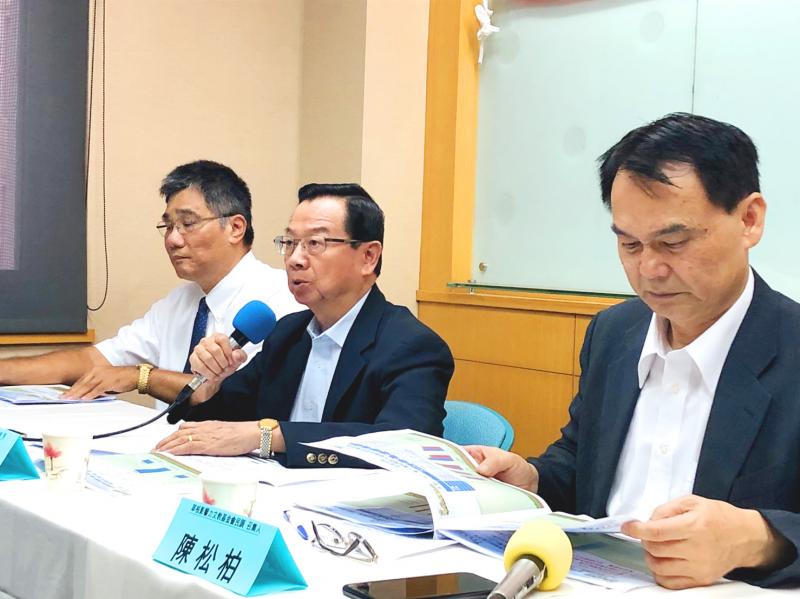Taiwanese appear divided over whether the government should allow more Chinese students to return to their studies at local universities amid the COVID-19 pandemic, a poll released yesterday by the Grassroots Influence Foundation showed.
The Ministry of Education on Aug. 5 announced that all foreign students could return to their studies in Taiwan, but later that day said that the policy did not include all Chinese students, sparking criticism.
According to the ministry, Chinese students who are to graduate this semester have been allowed to return since July 22.

Photo: Rachel Lin, Taipei Times
Asked if they support the government allowing Chinese students to return to their studies in Taiwan, 43 percent of respondents expressed support, while another 43 percent expressed disapproval, the poll showed.
Asked whether they think that restricting Chinese and other foreign students from returning would endanger the survival of many local universities, 46 percent disagreed, while 32 percent agreed.
Asked whether the government’s policy on Chinese students hinges on political considerations, 48 percent agreed, while 38 percent disagreed.
The poll found that 76 percent of respondents considered the COVID-19 situation in China more serious than in other parts of the world.
Asked whether Taiwan should maintain a confrontational or friendly posture toward China, 64 percent opted for friendly ties, while only 15 percent chose confrontational relations, the poll showed.
Respondents aged 18 to 29, more than other age groups, showed more support for confrontational relations with China, it found.
Despite 46 percent of respondents saying that restricting Chinese and other foreign students from returning would not affect the survival of local universities, foundation poll section convener Chen Sung-po (陳松柏) said that keeping Chinese students from returning could affect the income and operations of many schools.
“Our democracy can be an inspiration to Chinese students,” he said.
Institutions of higher education in Taiwan could lose NT$880 million (US$29.82 million) per year if the government continues to block Chinese students from returning, Private Education Association chairman Tang Yen-po (唐彥博) said.
Taiwan and China are overly sensitive and are politicizing the issue, former Shih Chien University president Michael Chen (陳振貴) said.
Taiwan from Jan. 26 suspended the entry of Chinese students due to the COVID-19 pandemic, while China in April stopped Chinese graduates from pursuing further study or work in Taiwan.
China should acknowledge the existence of Taiwan, as well as the difference between their political systems, so that the two sides of the Taiwan Strait can peacefully promote academic exchanges under the principles of parity and mutual benefit, he added.
The poll, conducted by the TVBS poll center, collected 1,076 valid samples, and has a margin of error of 3 percentage points.

The Ministry of Economic Affairs has fined Taobao NT$1.2 million (US$36,912) for advertisements that exceed its approved business scope, requiring the Chinese e-commerce platform to make corrections in the first half of this year or its license may be revoked. Lawmakers have called for stricter enforcement of Chinese e-commerce platforms and measures to prevent China from laundering its goods through Taiwan in response to US President Donald Trump’s heavy tariffs on China. The Legislative Yuan’s Finance Committee met today to discuss policies to prevent China from dumping goods in Taiwan, inviting government agencies to report. Democratic Progressive Party Legislator Kuo Kuo-wen (郭國文) said

The Ministry of Economic Affairs has fined Taobao NT$1.2 million (US$36,900) for advertisements that exceeded its approved business scope and ordered the Chinese e-commerce platform to make corrections in the first half of this year or its license would be revoked. Lawmakers have called for stricter supervision of Chinese e-commerce platforms and more stringent measures to prevent China from laundering its goods through Taiwan as US President Donald Trump’s administration cracks down on origin laundering. The legislature’s Finance Committee yesterday met to discuss policies to prevent China from dumping goods in Taiwan, inviting government agencies to report on the matter. Democratic Progressive Party

Taiwan and its Pacific ally Tuvalu on Tuesday signed two accords aimed at facilitating bilateral cooperation on labor affairs, according to Taiwan’s Ministry of Foreign Affairs (MOFA). The governments inked two agreements in Taipei, witnessed by Foreign Minister Lin Chia-lung (林佳龍) and visiting Deputy Tuvaluan Prime Minister Panapasi Nelesone, MOFA said in a news release. According to MOFA, the agreements will facilitate cooperation on labor issues and allow the two sides to mutually recognize seafarers’ certificates and related training. Taiwan would also continue to collaborate with Tuvalu across various fields to promote economic prosperity as well as the well-being of their

Sung Chien-liang (宋建樑), who led efforts to recall Democratic Progressive Party (DPP) Legislator Lee Kun-cheng (李坤城), was released on bail of NT$80,000 today amid outcry over his decision to wear a Nazi armband to questioning the night before. Sung arrived at the New Taipei District Prosecutors’ Office for questioning in a recall petition forgery case last night wearing a red armband bearing a swastika, carrying a copy of Adolf Hitler’s Mein Kampf and giving a Nazi salute. Sung left the building at 1:15am without the armband and covering the book with his coat. Lee said today that this is a serious